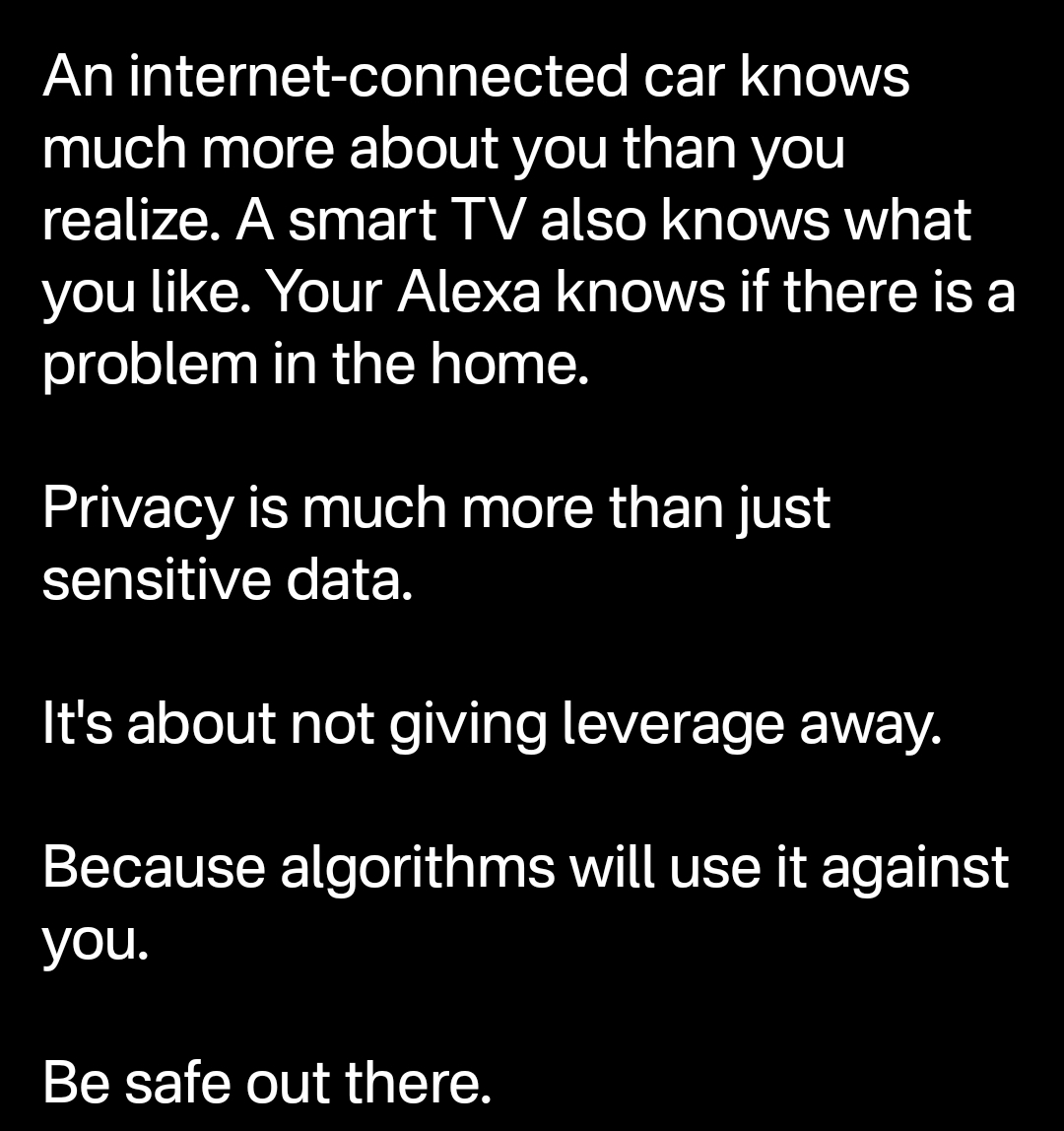
post text
Picture this:
- You type on Google “laptop won’t turn on”
- Google now knows you have a broken laptop and can estimate how desperate you are to fix it.
- Because it knows how desperate you are, it can increase shop prices proportionally.
You are going to pay the maximum they get you to pay.
That’s algorithmic pricing.
The more companies know about you, the more they can predict and sell how desperate you are to other stores out there.
An internet-connected car knows much more about you than you realize. A smart TV also knows what you like. Your Alexa knows if there is a problem in the home.
Privacy is much more than just sensitive data.
It’s about not giving leverage away.
Because algorithms will use it against you.
Be safe out there.

The best thing is these companies will say it’s not violation of your privacy because they sell the data without a direct link to your name or address. But guess what? They bundle it with all kinds of other identifiers like age, sex, weight, approximate location, whatever else you give them. The insurance company then takes that and modifies the category that is specifically this age bracket, approximate location, weight, age, beer and donuts in the fridge. And surprise! You fit all these “anonymous” identifiers.
But no harm done, your identity is safe 👍
it would seem like someone’s name is the least useful data point
That’s the whole thing about browser fingerprinting too. Take the set of internet users who have a particular version of a particular operating system, a particular version of a particular browser, having a particular set of typefaces installed, having a particular language preference, and you’ll find yourself in the intersection of all of them.
Remember, kids, it only takes 32 bits to uniquely identify any person on the planet. That’s 32 yes or no questions. Of course, they have to be perfectly crafted questions, but identifying power of fingerprinting must not be underestimated.
Clearly we all need to upgrade our personalities to a new 64-bit architecture.
Actually I think the world population is such that you need to add one or two bits.
Ok, fine, 33 bits 😂 Wikipedia says the world population is 8 billion, and python tells me that
math.log2(8e9)is 32.897.To add to this.
Here’s a website to help you check your own trackability:
https://coveryourtracks.eff.org
It can also help give you advice on how to improve your privacy.
Things that help: (tldr use adblockers but otherwise it’s really about blending into the crowd)
Hard to track: uses Firefox with uBlock origin. Maybe using a popular VPN. Uses an iPhone or a popular model of Android like the Pixel (although Google owning Android/Pixel might mean they get your data anyway…)
Actually very easy to track: uses a niche Chromium-based browser you got from GitHub with niche GitHub project as blockers and a little/known VPN. Uses a niche brand of smartphone with a niche non-Android based OS on it.
That was interesting.
Is there an add-on that changes the header information from an HTTP request to show bogus but common identifying information?
That is crowdsource the most common configurations and set that as the default in the add-on, so now you look like just another face in the crowd.
It’s more than just the header information. The graphics and audio checksum can give away details of what your device is, even if those details don’t match what header information you are sending. That mismatch is itself information they can use.
Brave is the only browser I can actually get a decent score with, too bad it has crypto brainrot
Well said and a core concept people need to understand to appreciate data privacy/sovereignty. Simply calling it data overlooks what it often is: your behavior over time. We don’t call it PII but few things are more personally identifying.